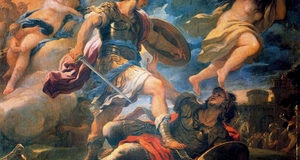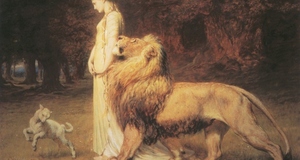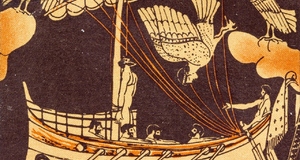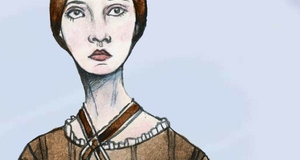From Discussions VOL. 5 NO. 2Four Lines to Immortality: Dido's Renaissance Through Josquin des PrezOne reason for the Church's adoption of Virgil appears in the Fourth Eclogue15, written in 40 B.C.16 The beginnings of this allegorical intervention seem to stem from Emperor Constantine in 324 A.D. His quotation of the Eclogue gave the work prominence in the newly Christian empire. The language of the Fourth Eclogue17 is lofty and somewhat vague, yet its message is well suited for Christian interpretation. Virgil states early in the work that the birth of one child will change the course of humanity, that a great race shall arise from the arrival of this sacred child. A translation of the Latin states: Justice returns, returns old Saturn's reign, Men of the Catholic Church saw themselves as this new race whose golden age was ushered in by the birth of Jesus. The Eclogue elaborates on the blessings brought forth by child's birth. The poem speaks of gods and men living harmoniously, a fertile and abundant earth, and an age of great joy and wisdom under the rule of the child and his father. It even suggests Christ's ability to forgive sin. Under thy guidance, whatso tracks remain The holy nature of the child and his relationship with divinity, particularly his father, is also clearly stated. He shall receive the life of gods, and see Parallels to Biblical imagery can be easily drawn from the text; even the serpent from the Garden of Eden seems to make an appearance: "The serpent too shall die." (Ibid, line 31). Because the serpent's death is mentioned among the many results of the boy's birth, it also indicates a significant parallel to the triumph of Christ over evil. Because the poem is written in flowery prose, pastoral references and suggestions of divinity cause the Church to see Virgil's Eclogue as a reverent prophecy of Christ. Modern Classical scholars have attributed the Eclogue to more plausible subjects than the future Messiah. An heir of Octavian, Marc Anthony, or Virgil's patron, Pollio, could have been the original subject of the poem (Townend, 70). Yet the similarity of Virgil's predictive language to Biblical accounts was particularly striking to medieval readers, and thus the Church elevated him from poet to prophet (Thompson, 648). Beyond the poetry itself, association with some of the most highly revered figures in the Church gave Virgil a place of prominence. St. Augustine recounts in his Confessions his experience reading the Aeneid and how he was moved by the fourth book (Schmalfeldt, 615)18. St. Augustine speaks extensively of his education in Carthage, and the impact of his encounters with the great Greek and Roman poets. He chastises himself for his secular pity for Dido for several paragraphs. Who is more pitiful than a pitiable man without pity for himself-one who weeps for Dido, dead because she loved Aeneas, but not for himself, dead because he failed to love you, God, my heart's enlightener, the feeder of my soul's inner hunger, the vital principle breeding depth of thought out of my intelligence? I was the abandoner, the faithless lover, and my faithlessness earned the world's Bravo! Bravo!-since love of the world is abandonment of you, and the world cries Bravo! Bravo! to keep its own in line. For all this I had no tears, only tears for Dido, exploring with the sword her utmost doom (Augustine, Confessions, trans. Wills, 16). Virgil also appears extensively in the Divine Comedy, Dante Alighieri's fourteenth century epic poem about a Christian soul's journey towards salvation. Virgil appears as a spiritual guide through hell and purgatory. Dante so respected Virgil that he is presented as a guiding force in a work centered on Christian themes. Despite the writer's obvious admiration for his pagan predecessor, Dante was well aware of the boundaries; the polytheistic poet cannot pass into Paradise. Even viewed as a prophet of Christ, Virgil still had the impurities of his former religion to contend with (Hollander, 2) So why is Dido such a lasting figure? After all, as Schmalfeldt writes, "...it was for Dido, not Aeneas, that Augustine wept."(Schmalfeldt, 593). If The Aeneid were reinterpreted to allegorically represent the journey of the soul towards Christian salvation, then what part does Dido play? Much of book four undermines a Christian interpretation of The Aeneid, because she breaks a long standing vow of chastity. Should Dido not be resigned to the role of Aeneas' temptress, loathed for her manipulation of the pure hero? Christian teachings forbid illicit sex out of wedlock, and both of Virgil's characters are guilty of lust. Virgil's Dido is not a reformed temptress. She does not succeed in seducing Aeneas into staying in Carthage and becoming her king, so, she takes her own life so as to escape her broken vow and her shame. Dido chooses not to atone for her sins in a Christian manner; she commits suicide, one of the most abhorrent sins in Christianity. If anything, Dido's role is to undermine Aeneas' purity; he sleeps with the formerly chaste queen, yet has no intention of remaining in Carthage to care for her as a second husband. It appears that the continued fascination with the Carthaginian queen was due to the unresolved tensions in Virgil's treatment of Dido with respect to Aeneas' quest. There is an aspect of cruelty in Aeneas' treatment of Dido; yet all is forgiven in the name of destiny. Aeneas' shortcomings are accepted as divine intervention and gods' attempts to interfere with destiny. The queen is simply a pawn of meddling deities; however, the supposedly pious Aeneas could have refused her love the night of the storm. While Aeneas continues his quest with no consequences for his actions, Dido is left dead at the end of the fourth book. Dido is a victim of Aeneas and gods, and yet she is the one who loses her life. Her love was not true; it was induced. Perhaps she would never have fallen for Aeneas if Amor had not intervened.Continued on Next Page » Suggested Reading from Inquiries Journal
Inquiries Journal provides undergraduate and graduate students around the world a platform for the wide dissemination of academic work over a range of core disciplines. Representing the work of students from hundreds of institutions around the globe, Inquiries Journal's large database of academic articles is completely free. Learn more | Blog | Submit Latest in Literature |



















